Content Sections
We kicked off 2020 with a survey – our 2020 Vision Survey – asking our readers to share their thoughts in five key areas that are important to so many of us – food, healthcare, politics, environment and natural health.
Thank you to everyone who took the time to share their thoughts with us. Interestingly, we also had feedback that many people found the questions we posed made them think hard about their responses and they found it challenging to prioritise one option over another. This means we can take stock especially where there is a stand-out response, but less so when there’s not much difference between individual choices.
The long and short of it is that we had complete responses from 303 of you, 84% being female, the majority being over 35 and under 75 years of age, with the biggest single group (35% of total) being in the 55- to 64-year age group. And where did the respondents come from? Seventy five percent were in the UK, 10% in other European countries, 4% from North America and the rest spread out across all continents of the globe. The data gathered are helping us formulate our strategy going forward into the new decade so we can continue to represent your views in our work.
One of the big take-homes is that there was one stand-out priority for all five areas, with the exception of politics, where the results for each option were more evenly distributed.
So, let’s look more closely at the results.
Highlights
- Freedom to choose natural health options in healthcare was highly valued by over fifty percent of respondents. That’s the basis on which we founded ANH 18 years ago – and it’s great to see it’s still a top priority today!
- Forty percent of respondents said their own experience is the single most important factor guiding their choice of healthcare, as compared with only 8% relying on the advice of their GPs
- The health benefits of food along with a desire to choose unprocessed or minimally processed foods were the two most important factors determining your choice of foods
- Hear this politicians: The environment, economics (national and personal) and healthcare were chosen as your top three priorities in the political arena, but in that that order
- Perhaps unsurprisingly, climate change was chosen as the top environmental concern, with biodiversity and species extinctions being the next most important.
Drilling deeper into the data
Let’s now take a look at the actual response rates for each of the questions we asked respondents to prioritise across the five big issues.
Food
Q1: Which of the following drivers, in order of decreasing importance most influence your choice of foods?
The overriding driver (42% of responses) for your food choices related to their perceived health benefits. This means respondents really appreciate all-important messages like ‘food as information’ and ‘food as medicine’. Government authorities and healthcare professionals who still look at food largely as a source of calories (energy) have yet to recognise the potency of diet and lifestyle choices in medicine. A desire for unprocessed or minimally processed foods was next in line and it was perhaps something of a surprise that the environmental impact of food production was the lead priority for the smallest number of respondents (just 2%) and even local sourcing wasn’t a big priority.
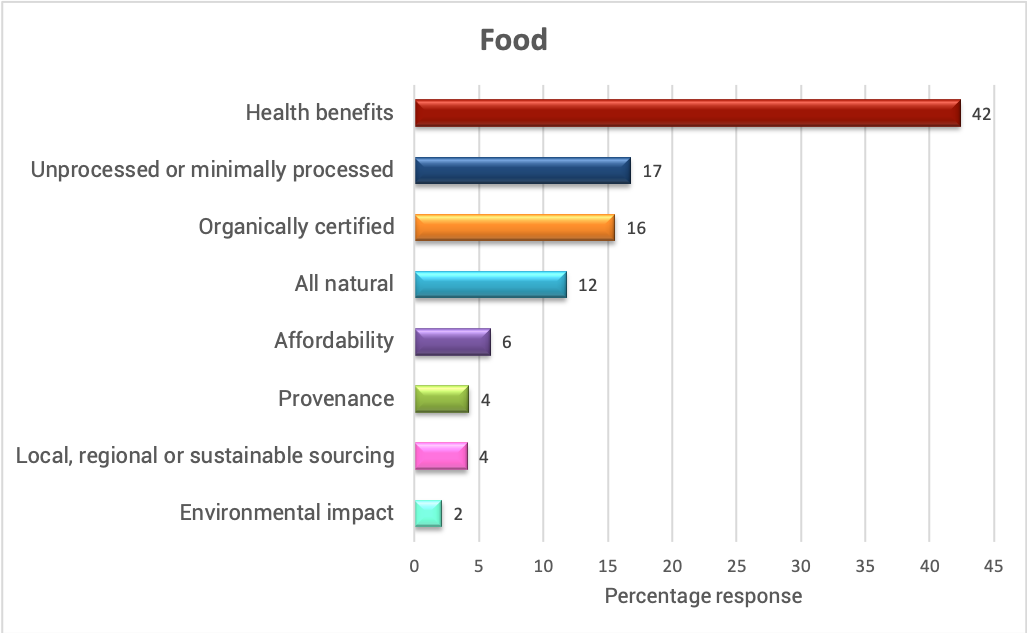
Healthcare
Q2: Which of the following factors, in order of decreasing importance most influence your healthcare choices?
These results were especially interesting to us. Right out there with almost twice the rating of the the next most important issue was the influence of your own experiences. This is something that the medical establishment has been trying to dismiss with its particular strain of evidence-based medicine that’s meant to banish having regard for what people experience. To be replaced instead with the findings of double-blind, placebo-controlled, randomised trials, often conducted under conditions that are not representative of the real-world, with findings often being biased by industry funding. Recommendations from integrative medicine practitioners, perhaps unsurprisingly amongst our selective audience, was three times more important than recommendations from GPs. Also – while science was considered important, our results suggest that our readers are engaging with the science themselves via their own internet searches. That’s perhaps something of an indictment of the level of trust we have for the medical authorities, the views of which were considered unimportant for many. Could that reflect something of the distrust in these authorities we now have, given the dubious advice we’ve had from them for years on issues like cholesterol and saturated fats?
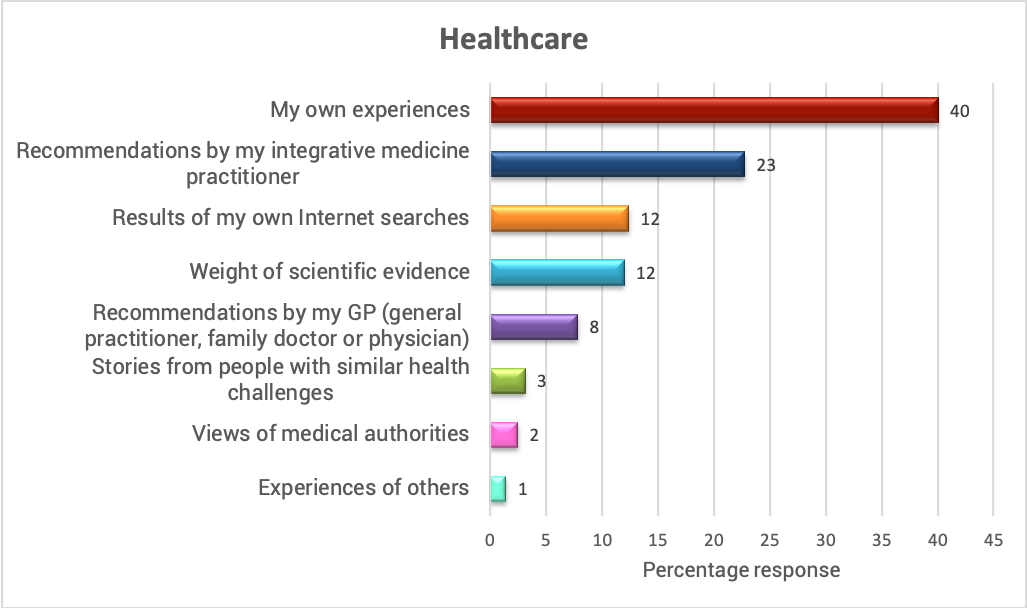
Politics
Q3: Which of the following areas, in order of decreasing importance are most important to you when considering your political or voting choices during national or local elections?
Ten years ago we might not have expected so many to place the environment as the top issue on the political agenda. More and more people now understand that human life and the health of the the planet on which we live and depend are inexorably intertwined. We recognise how human activity is the most destructive force on the planet, yet, equally, many feel it may not be too late to rescue both our planet and ourselves without radical changes to our behaviours, values and priorities. For that we need the political will. Economics, long the lead issue for politicians, made it into second place with still a lot of emphasis on healthcare and social care. These four areas were the lead priority for nearly 90% of respondents with immigration and national security being of least concern among those polled.

Environment
Q4: Which of the following environmental issues are most important to you?
In our office, this was a tough one to answer – we wanted to make the whole lot our top priority! But climate change came out as the priority issue for most, probably because it encompasses so many of the other areas as well, scoring over twice the ratings compared with the second highest priority issue, namely biodiversity and species extinctions. Protecting the oceans was least selected as a top priority, but we don’t think this is because people don’t care about the oceans. Our oceans might be out of sight and out of mind to many but they’re a huge buffer in our closed planetary system, the health of which is crucial for all of life, including us!
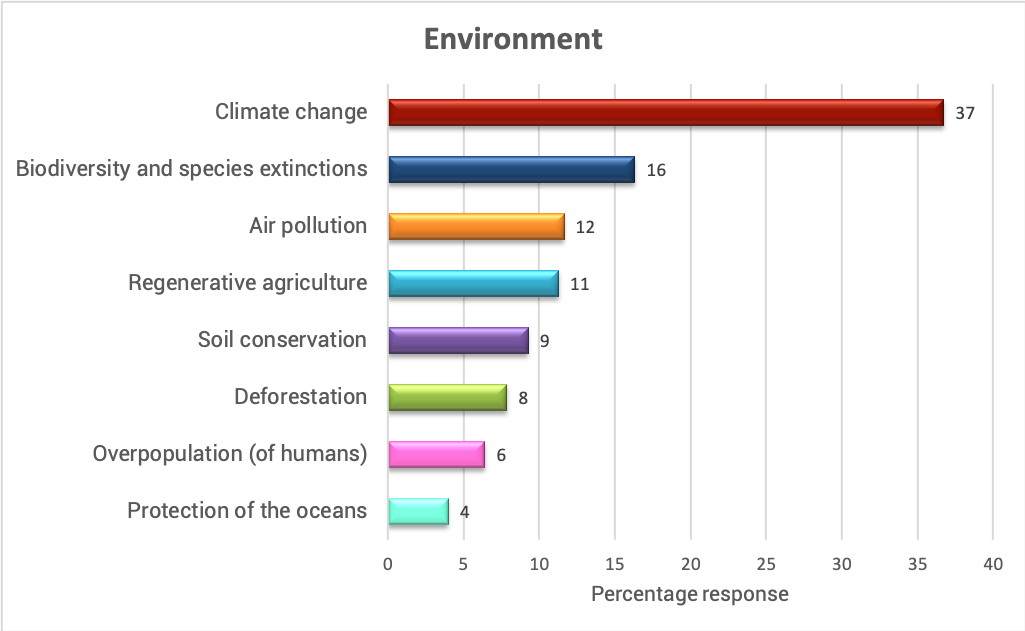
Natural Health
Q5: Which of the following issues relating to natural health, its practice and accessibility, are most important to you?
Way out front as your top priority was your freedom to choose natural health options. This reflects concerns that an increasingly autocratic, corporatocratic system of healthcare control continues to be a major threat to those of us who use natural health as our mainstay. Access to natural therapies came a distant second, being prioritised similarly to integration into mainstream healthcare along with reducing toxic exposures. Food supplements was the top priority for very few (just 2%), probably being encompassed for many under both freedom of choice or natural therapies.

Take-home
We must always be cautious when reading into data. It might seem like an anomaly that so few of you selected options relating to environmental impacts when making food choices, yet the environment was selected as the issue that should be given the greatest priority in politics. Some of that’s down to the fact that we asked you to prioritise the top area within each of the 5 issues and there was no weighting either within options or between questions.
However, that said, among the resounding messages we’ve got from our respondents is that you want sovereignty over your health, you want freedom to choose, and you want to make decisions that make sense to you. You don’t simply want to follow the diktats of your doctor or national medical authorities.
It also looks like you’re among a relatively small, but growing, group of people who understand the interconnection between human health and our environment. If we’re to manage our health, we also have to look after our environment – and we need our politicians to get their heads around this so they can truly act as our elected representatives.





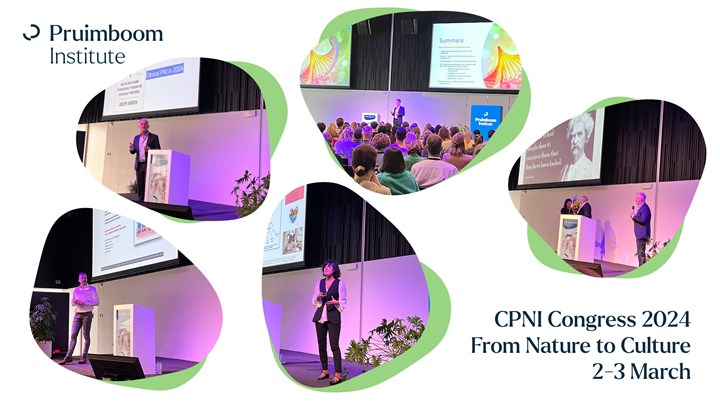

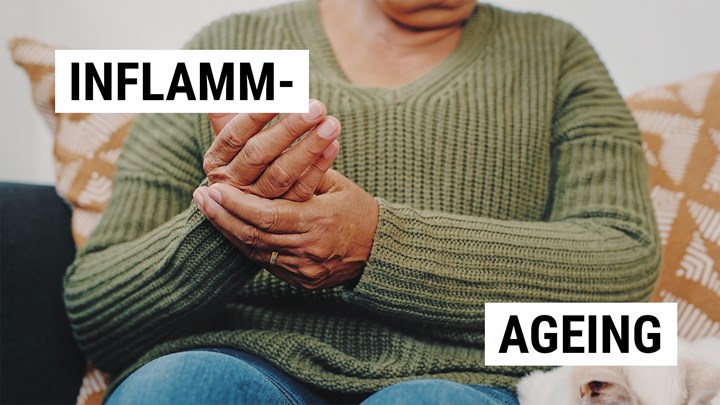
Comments
your voice counts
20 February 2020 at 10:26 am
Alas the ANH readership voted for national security, defence and terrorism under false flagging narratives of climate weaponisation and environmental ju-jitsu that uses our legitimate love of life and nature as a means to commodify and control it under even more complex web of systemic regulation - backed by 5G+ Internment of Things.
The use of the mainstreaming Media to shape and frame opinion is the LOSS of freedom of the Press or independent journalism to manufactured groupthink.
Note that in terms of FOOD - environmental impact is given least weighting.
So what is the survey revealing - but the responses to framed questions?
I find much of our language degraded by misuse/abuse - and so my sense of 'environmental impact' is skewed by its abuse in terms of carbon dioxide (carbon life forms are the virus in that scenario - ie Us!).
I deplore the pollution of our shared support and commonwealth by private agenda running outside the law by effectively setting the regulations for its own sustainability at expense of Life. But Food has been weaponised (globally) since the first Green Revolution - (read Engdahl's 'Seeds of Destruction') along with energy - as a means of control.
What does it profit Man - to gain the world by the sacrifice of Soul?
The Feeling-knowing of Life is NOT emotionalism or sentimentalism or wishful thinking - but the Prior Connectedness that a mental fragmentation of 'disconnection' splits from in images and forms of substitution. Narcissus thinks he SEES but is entrained by his own imaged thinking that effectively blocks the relational Call of Shared Being.
Movement on the face of the water may SEEM dissonant to a learned worldview - but provides the opportunity to SEE from an Embracing perspective rather than react within a framed response.
Your voice counts
We welcome your comments and are very interested in your point of view, but we ask that you keep them relevant to the article, that they be civil and without commercial links. All comments are moderated prior to being published. We reserve the right to edit or not publish comments that we consider abusive or offensive.
There is extra content here from a third party provider. You will be unable to see this content unless you agree to allow Content Cookies. Cookie Preferences